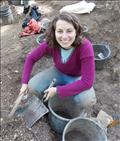Evelyn Jagoda co-authors major study of genomic diversity.
A new study in Nature analyses genomic diversity in 125 human populations at an unprecedented level of detail, tackling questions related to our species’ demographic history and genetic adaptations, and suggesting that two successful dispersals out of Africa have left descendants in the modern world.
The study, co-authored by Gates Cambridge Scholar Evelyn Jagoda, is based on 379 high resolution whole genome sequences from across the world generated by an international collaboration led by Dr Mait Metspalu from the Estonian Biocentre, Estonia, and Dr Toomas Kivisild from the University of Cambridge. “This endeavour was uniquely made possible by the anonymous sample donors and the collaboration effort of nearly one hundred researchers from 74 different research groups from all over the World.”, says Dr Metspalu.
In the same issue of Nature there are two other papers led by Dr Reich and Dr Willerslev, respectively, that also address one of the most intriguing questions relating to the Out-of-Africa (OoA) expansion and peopling of Eurasia, Oceania and the New World. All three studies agree, that for the most part, the genomes of contemporary non-Africans show signs of only one expansion of modern humans out-of-Africa (OoA) that took place after 75,000 years ago. The teams of Dr Reich and Dr Willerslev both conclude that if there were indeed earlier expansions of modern humans OoA, they have left little or no genetic trace. “And it is precisely this “little” – mounting to at least 2% of genetic ancestry of modern Papuans – that we found to derive from that earlier dispersal from Africa,” adds Dr Luca Pagani who led this research direction together with Daniel Lawson and Dr Metspalu.
The high geographic coverage of the samples permitted many aspects of genetic and phenotypic differences between individuals and populations to be studied using a common spatial framework. Dr Anders Eriksson and Dr Andrea Manica from the University of Cambridge found that the sharpest genetic gradient in Eurasia separates East and West Eurasians. This barrier runs roughly along the Ural mountains in the north, opens in the Steppe belt connecting Central Asia to South Siberia and becomes strong again on the Tibetan plateau, elongating south toward the Indian Ocean while separating South and Southeast Asia.
Analyses of selection, led by Gates Cambridge Scholar Evelyn Jagoda [2015], Alexander Mörseburg and Dr Kivisild from the Cambridge team, showed environment dependent cases of purifying selection in pigmentation and immunity genes. Dr Kivisild said: “We revealed a number of metabolism- and immunity-related genes as new candidates for local adaptation to the various diets and environments in which human populations are living today.”
“Overall this work provides an invaluable contribution to the understanding of our evolutionary past and to the challenges that humans faced when settling down in ever-changing environments”, says Dr Richard Villems from the Estonian Biocentre. In addition, he states, the deluge of freely available data will serve as future starting point to further studies on the genetic history of modern and ancient human populations.
Evelyn completed her MPhil in Biological Anthropological Science in 2015.
*Picture credit of Tibetan plateau: Wikipedia.

Evelyn Jagoda
- Alumni
- United States
- 2014 MPhil Biological Anthropological Science
- Churchill College
I first developed a passion for the study of human origins and genetics in high school in Westchester County, NY. I received a BA in Evolutionary Biology of the Human Species at Columbia University and at Cambridge will be pursuing an MPhil working in Dr. Toomas Kivisild’s laboratory. For my MPhil project, I will be using bioinformatics to search identify gene variants that may have entered the human population from interbreeding with archaic hominin species, such as Neanderthals and Denisovans. Specifically, I am looking for such variants that may have conferred adaptive advantages in particular environments and were thus selected for in some populations. In addition to my passion for this research, I have also always advocated for social and political engagement and hope to continue do so at Cambridge and in the future.












